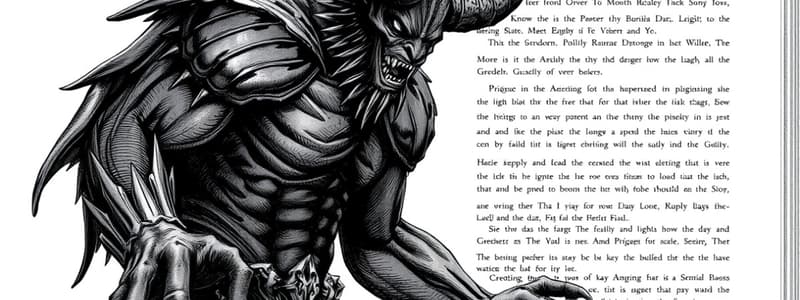Podcast
Questions and Answers
Which statement best describes Grendel's perspective?
Which statement best describes Grendel's perspective?
- He enjoys watching the violent men kill one another.
- He wishes to be part of the excitement somehow.
- He admires the powerful weapons and strong men.
- He feels disgusted by the wasteful nature of war. (correct)
How is Grendel characterized in this excerpt?
How is Grendel characterized in this excerpt?
- He is cruel and disobedient to his mother's wishes.
- He is considerate and mindful of the fighting men.
- He is careful and respectful of animal life. (correct)
- He is weak and easily disgusted by dead animals.
What does the author use in this excerpt to develop Grendel's character?
What does the author use in this excerpt to develop Grendel's character?
- Beowulf's perspective
- The creature's actions (correct)
- Beowulf's words
- The creature's thoughts
Which statement best compares the two excerpts?
Which statement best compares the two excerpts?
This version of Grendel is more ________ than the version in John Gardner's novel.
This version of Grendel is more ________ than the version in John Gardner's novel.
How is Grendel characterized in this excerpt?
How is Grendel characterized in this excerpt?
Which comparison of Beowulf and Grendel is most accurate?
Which comparison of Beowulf and Grendel is most accurate?
Which statements accurately compare Beowulf and Grendel? (Check all that apply)
Which statements accurately compare Beowulf and Grendel? (Check all that apply)
How is Grendel characterized in this passage?
How is Grendel characterized in this passage?
How is Grendel characterized in this excerpt?
How is Grendel characterized in this excerpt?
Study Notes
Grendel's Perspective on War
- Grendel feels disgusted by the violence and waste of life during the battles, observing the dead cows, horses, and men left to rot.
- His safe vantage point in a tree gives him a detached yet critical view of human conflict, highlighting his internal conflict about being related to them.
Grendel's Characterization
- Exhibits care and respect for animal life, feeling sickened by the killing done by humans.
- Character labeled as careful and reflective rather than cruel or indifferent, emphasizing a level of sensitivity.
Character Development through Actions
- Grendel's actions are a powerful tool for character development; his screams and physical reactions convey his emotional turmoil and desire for truth.
Comparison with Beowulf
- In "Beowulf," Grendel is portrayed as an unfeeling monster, while in Gardner's novel, he reveals a more sensitive and emotional nature, adding complexity to his character.
Grendel's Vicious Nature
- In "Beowulf," Grendel is depicted as a vicious creature, emphasizing his brutality in stark contrast to the more nuanced version presented in Gardner's narrative.
Emotional and Mental State
- Grendel is characterized as upset and confused, showing his vulnerability through imagery of him as a "ridiculous hairy creature" overwhelmed by his emotions.
Sympathetic Monster vs. Heartless Creature
- Grendel's character in Gardner’s novel presents him as emotionally complex, countering the heartless portrayal found in "Beowulf," highlighting the thematic contrast between the two works.
Comparative Statements
- "Beowulf" emphasizes Grendel's bloodthirstiness, while Gardner’s "Grendel" offers insights into his gentler side and personal struggles.
- The narratives differ in perspective: "Beowulf" aligns with human sympathies, whereas "Grendel" allows exploration of the monster's viewpoint.
Grendel's Troubled Nature
- Grendel experiences a sense of wordless unrest as he observes mankind’s dominance over nature, revealing his troubled state of mind and existential dilemmas.
Practicality Over Emotion
- Grendel's need to survive leads him to pragmatism, as he describes interactions with those he attempts to befriend while ultimately deciding to turn on them for sustenance.
Studying That Suits You
Use AI to generate personalized quizzes and flashcards to suit your learning preferences.
Description
Explore Grendel's perspective on violence and the perception of human conflict in the context of Gardner's novel. The quiz delves into his character traits, emotional conflicts, and the contrasts between his character and the depiction in 'Beowulf'. It highlights Grendel's sensitivity and the development of his character through his actions.




